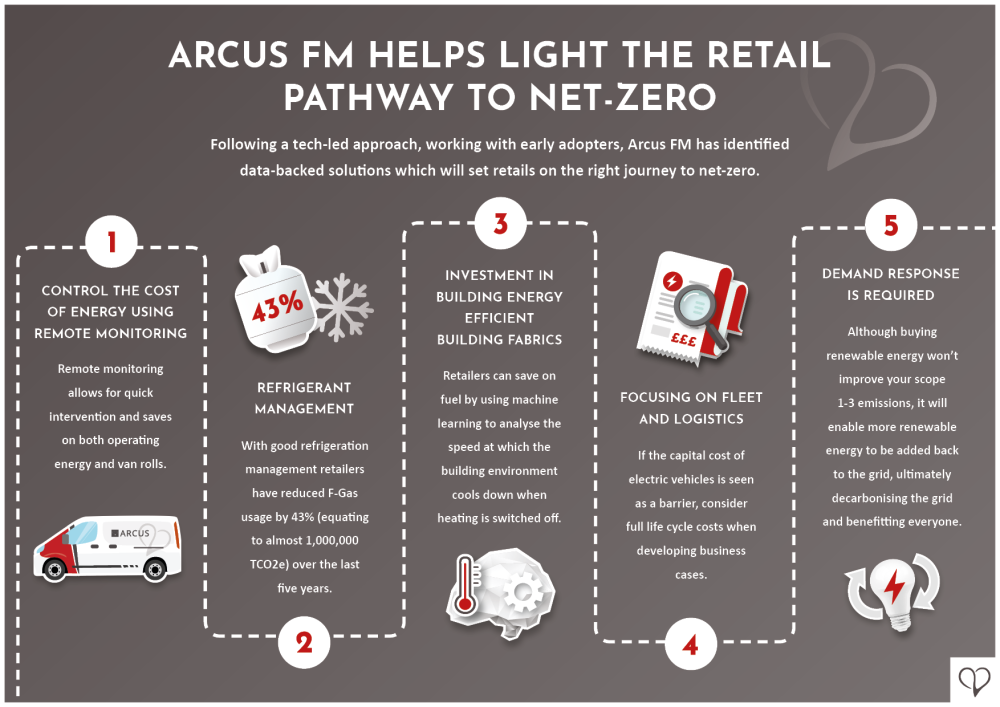Following a tech-led approach, working with early adopters, Arcus FM has identified data-backed solutions which will set retails on the right journey to net-zero.
Control the cost of energy using remote monitoring
Remote monitoring of refrigeration and BMS systems allows for quick intervention, without the need for an engineer to visit site, saving on both operating energy and carbon from van rolls. The data generated means conditional based logic can be implemented to optimise settings against weather conditions and operational requirements. Using Enterprise level commands, settings across the whole estate can be modified instantaneously. Alternatively, by connecting directly to a specific asset, settings can be modified at a granular level, helping report accurately on your emissions and provide meaningful data to make fast, informed decisions to limit your carbon impact, lowering and controlling the cost of energy. If these are linked to capital planning tools, it allows visibility to decide if it’s more cost and environmentally effective to replace the kit rather than continuing to repair it.
Refrigerant Management
F-Gas regulations are currently under review in both the EU and the UK. From 2022, any new refrigeration equipment with more than 40kW of cooling duty will need to be installed with a GWP less than 150. This means equipment selection-based energy efficiency and refrigerant type will be crucial and AC refrigeration will come under the regulations too. Refrigerants will need to be natural including CO2, Ammonia, hydrocarbons or the newer A2L refrigerants. However, selecting the refrigerant with the lowest GWP might not be the best solution. Location and type of application with an understanding of the energy efficiency of the refrigeration equipment is essential.
It’s also important that equipment is serviced by engineers who understand how to operate it at its most efficient – this should be corroborated with remote assistance via dedicated energy teams monitoring energy usage and operation.
Most major supermarkets have adopted upgraded strategies to replace equipment with high GWP refrigerants with low GWP alternatives. For some retailers, aging systems have created the potential for leakage, resulting in greater emissions and less efficient systems. So, to be serious about net-zero, it’s critical to have a good refrigerant management plan in place.
By being proactive, monitoring data and analysing refrigerant usage, we highlight key component/equipment failures to target specific issues and allow support to the retailers to ensure the refrigerant usage is being controlled and reduced annually.
With a good refrigeration management strategy and supporting its contractors over the last 5 years, some retailers have managed to reduce F-Gas usage by 43% equating to nearly a 1,000,000 TC02e reduction.
Investment in building energy efficient building fabrics
Investment in building energy efficient building fabrics and the resultant EPC rating can often be a challenging dialogue between landlord and tenant. However, there are still ways to improve performance.
By using machine learning of a building environment to analyse how quickly the temperature cools down when the heating is fully switched off and triangulate this with weather data, the retailer can save on fuel. At Arcus FM, our IoT product, HVAC drift, is similar to the stop/start function in car engine management and ensures you are being the most efficient with the building you have.
Focusing on fleet and logistics
We have learned a few lessons in moving our van fleet to electric light goods vehicles. If the capital cost of electric vehicles (EVs) is seen as a barrier, consider full life cycle costs when developing business cases. However, don’t forget to factor in future Government grant cuts as a risk to business cases and budgets.
Research and understand the current limitations of EVs, i.e. charging infrastructure and mileage range reduction due to cold weather. Work within the ‘real-life’ limits not the manufacturer stated limits. A 20-25% reduction on advertised range in ‘real-life’ driving conditions is not uncommon, and this is without a significant load. With this in mind, it’s important to shift the focus from where EVs won’t work to where they could or will work.
Consider data collection methodologies for energy, carbon, and sustainability reporting, as well as cost-benefit analysis, purposes – information on spend and kWh usage are key. This is particularly important if chargers are required at colleagues’ homes.
If you are starting with a trial of a small number of vehicles, future proof your processes and partners to ensure they are capable of delivering a full roll out.
Work with your sustainability champions and early adopters to enable a smooth transition to EVs.
Demonstrate commitment and demand to the Government and manufacturers through collaborations and public electrification pledges.
Demand response is required
Companies believe when buying 100 percent renewable energy, you can relax, unfortunately it’s not the case. Is your contract adding additional renewables to the system? A challenge for your energy team. Whilst demand response will not improve your scope 1-3 emissions, by participating in these programs, you will enable more renewable energy to be added to the grid. Ultimately, this will continue to decarbonise the grid and benefit everyone. Demand response requires a contractor who not only understands the electrical markets but also intimately knows the risk being placed on your assets/operations in an event. Most companies have achieved turn down during potential TRIAD events leading to thousands of pounds worth of savings.
The ability to avoid this cost is being removed in the next couple of years however, the same strategies can be modified to participate in other flexible markets including selling back to the wholesale markets when they peak. This will go some way to filling the financial gap when power prices can reach as high as £300 a MW or indeed even using energy when the markets go negative to help balance the grid.
For more information about Arcus FM please contact Rebecca Berry, Marketing and Communications Manager, at Rebecca.Berry@arcusfm.com
To find out more about Arcus FM and the services they provide to the retail industry, click here.
This article was also published in The Retailer, our quarterly online magazine providing thought-leading insights from BRC experts and Associate Members.

